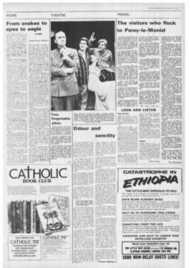Page 1, 30th November 1973
Page 1

Report an error
Noticed an error on this page?If you've noticed an error in this article please click here to report it.
Tags
Share
Related articles
Prayers For Moverley
Jubilee Celebration For Moverley
Bishop Moverley For Hallam
Mgr Heeran Collects A 'gold'
Plea To Protect The Rights Of Immigrants
Catholics urged to influence opinion
The keynote of a forthright pastoral letter by the two bishops of the Leeds diocese, Bishop Gordon Wheeler and Bishop Gerald Moverley, his Auxiliary, was: "It is tempting for us to say that politics and trade are the Government's business and not ours. But it is our Government."
They called in their statement, which was read in all churches of the diocese last Sunda). for a fair deal for the Third World. and asked Catholic people to try to influence public opinion towards this end.
The pointed out that while "politics, big business decisions and world shortages" were affecting the standard of living of British people, two-thirds of the world's people faced much greater difficulties. "Our wealth, health and educational standards serve as a measure of how little the people of the 'underdeveloped' world have. "it a family in our street or parish lived as so many families do in the Third World — with parents who. no matter how hard they worked, could not feed or provide for their children properly: with children who were illiterate as well as ill-fed and who faced a hopeless future, with disease, ill-health and a short life. all features of the family picture, because doctors were never seen and public health was non-existent. we would, I am sure. see it as our clear Christian duty to help. even if this meant that we had less for ourselves. We would give out of charity."
But charitable giving to "alleviate the plight of our neighbours overseas" was only a start. Christians must not turn their hack on the fundamental injustice which created the poverty.
"Our charity will help in tackling crisis situations but the basic problem of injustice will remain — and the people's troubles will continue.
"Which brings us hack to our tea. coffee and sugar. These and many materials like them are produced in poorer parts of the world. We. the rich countries, buy many of these raw materials more cheaply than we should. "The selling countries have little choice because if they do not sell at our price they may not sell at all. We strike hard bargains against desperate peoples to gain advantage and profit for ourselves. It is no doubt good business, but it is not Christian!
"Hence, we get what we need comparatively cheaply, and the workers in the poorer countries receive less than a fair day's reward for their work and are unable to help themselves.
"Worse even than that t On the matter of sugar, for example, the rich countries of the Common Market arc now planning to produce more sugar themselves and thereby remove the livelihood of many workers ii the Caribbean, who have no other way to earn a living.
"Should we buy our sugar from the already rich, or give the poor and needy the only chance they have got to go on working? The Christian answer is surely clear! We, who have too big a share of the cake already as a nation, are taking the crumbs from those who are already short.
"This example of injustice is typical of many others in which the rich countries use their strength and wealth for selfish and therefore unchristian, purposes."
So the two bishops called on local parishes to follow the diocesan example and set up groups concerned with justice overseas. They should sign the national "Europe '73" petition as a first practical step.
blog comments powered by Disqus











